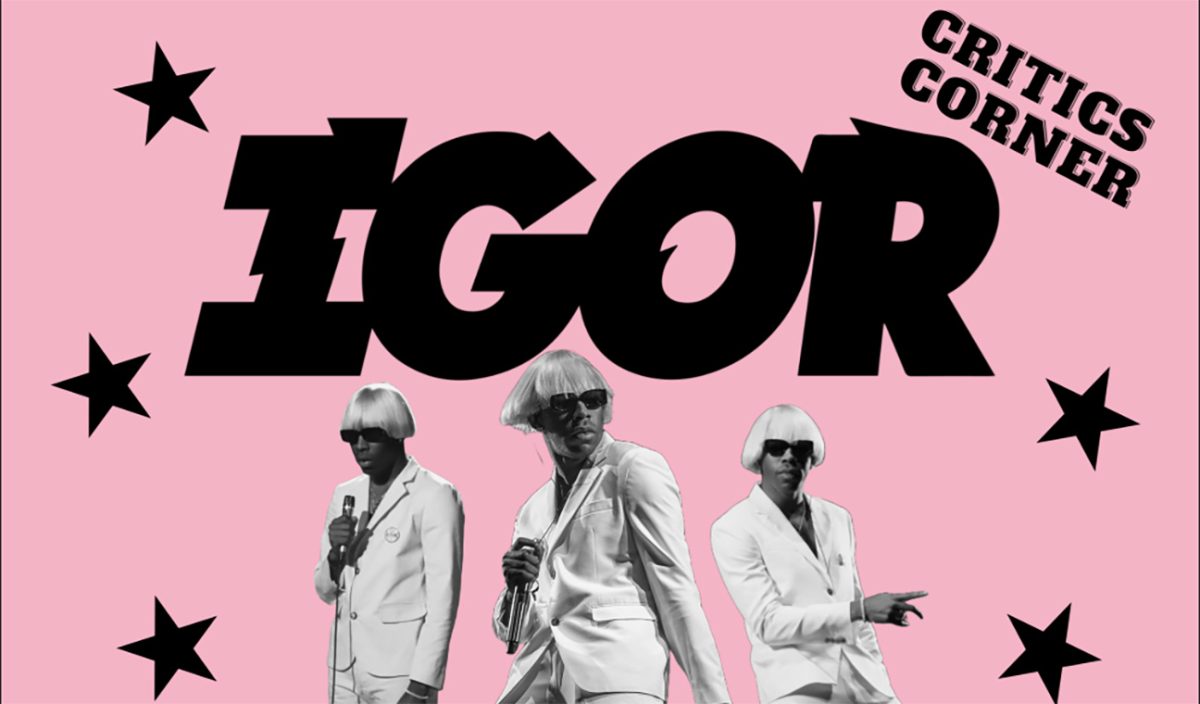“I don’t know what’s harder: letting go or just being okay with it,” Jerrod Carmichael says on “WHAT’S GOOD,” the ninth track on Tyler, the Creator’s 2019 album IGOR. Carmichael’s quote sets a precedent for the album’s central themes – love, anger, and loss – all of which are explored in depth as the album moves along an emotional storyline.
Tyler’s 2017 album Flower Boy saw his musical maturation. He began to move away from the harsh, violent rap of his former projects and embraced instead more personal topics over expertly produced beats. Flower Boy skyrocketed Tyler into the mainstream, leading mean to place heavy expectations on him for his next project, which came two years later with IGOR.
Tyler did not disappoint. IGOR is widely regarded as one of the best albums of all time. On IGOR, Tyler showcases some of his best production, with genius samples and expressive melodies.
The most prominent aspects of the album, however, are its storyline and meaning. As listeners unpack the album, track by track, the genius of IGOR is truly revealed.
IGOR opens with “IGOR’S THEME,” a synthy electronic track. This track sets the mood for the album to come, but it does not yet begin the story.
“IGOR’S THEME” also creatively foreshadows several later songs with its lyrics, most notably, “got my eyes open,” a reference to an important moment later in the album. Tyler also asserts, “they gon’ feel this one,” setting high expectations from the start.
The true story of IGOR begins with “EARFQUAKE,” a dancey, passionate love song. On “EARFQUAKE,” Tyler introduces the lead character of the story, and it seems as as though Tyler already as a problematic relationship with this mystery persona. He tells the mysterious figure, “don’t leave,” and admits that they “make [his] earth quake.”
It is made clear from the start that Tyler is deeply in love with this person and wants to be with them forever.
These passionate feelings are strengthened by “I THINK,” the next track on the album. “I THINK” is relatively straightforward. Tyler announces, “I think I’m falling in love, this time I think it’s for real.” As the song progresses, the chorus becomes stronger and more powerful, adding background vocals from Solange, further emphasizing Tyler’s growing feelings for the mysterious persona.
After “I THINK,” Jerrod Carmichael has a short interlude in which he claims that “exactly what you run from, you end up chasing.” At first, the interlude may feel random or out of place, but it becomes extremely relevant as the album and storyline progresses.
Tyler experiences a shift with “RUNNING OUT OF TIME” when he realizes that time is running out to make the person love him back. He knows that he must act soon, or his love interest might move on and find someone else.
Tyler also gives some insight to the identity of the person, directing that they “take [their] mask off” and “stop lying.” This clue suggests that Tyler’s love interest might be a man who is hiding his true self behind a mask, preventing their relationship from deepening.
Tyler’s tone is deeply frustrated by the end of “RUNNING OUT OF TIME,” and his frustration climaxes in the following track.
“NEW MAGIC WAND” is aggressive and unrestrained as Tyler expresses genuine anger towards his love interest. “NEW MAGIC WAND” reveals a harsh reality of the story: Tyler’s love interest has a girlfriend. Due to this predicament, Tyler decides that he “need[s] to get her out the picture” because their relationship is “not developed” like the relationship between Tyler and the mysterious figure.
The “magic wand” that Tyler speaks of is a euphemism for a gun. At the climax of his anger, Tyler claims, “she’s gonna be dead, I just got a magic wand.” It is unclear whether Tyler actually kills the girlfriend or if the song is merely a demonstration of his frustration, but either way, it is clear that Tyler is willing to take extreme measures in an attempt to salvage the relationship he holds dear.
If Tyler held the gun in “NEW MAGIC WAND,” his love interest now holds it in “A BOY IS A GUN,” the seventh track of the album. Tyler finds himself begging his love interest not to “shoot [him] down,” and he says that his love is “so . . . dangerous.”
It is clear that the mysterious figure is losing patience with Tyler and is on the verge of completely cutting him off. The mysterious persona still refuses to be open about his attraction, and Tyler asks him again to “take [his] hoodie off” and to “make [his] . . . mind up.” By the end of this track, Tyler is apparently finished with his infatuation, and he finally begins to come to terms with the improbability of their relationship working out. He asserts that he wants to “leave as friends.”
Even though Tyler began to come to terms with reality on “A BOY IS A GUN,” he seems to regress slightly on “PUPPET,” reaching a state of conflict between loving and letting go. He admits that he wants to “call and talk” and “walk to front door and knock” as a way of rekindling the relationship. Despite this overture, however, he acknowledges the danger of his infatuation when he starts to wonder “is this my free will or yours?”
True to the title, the chorus of “PUPPET” speaks of Tyler being the man’s puppet. Tyler’s actions are completely controlled by how his love interest reacts. Jerrod Carmichael returns at the end of the song, stating that “at some point, you come to your senses,” just as Tyler finally does.
“WHAT’S GOOD” follows with heavy drums and sharp synths. The track does not add much to the overall story of the album and is more of a traditional braggadocious rap song where Tyler flaunts his fame and superiority. The track does, however, build on the earlier theme of Tyler finally achieving clarity concerning his relationship with his love interest. He repeats, “I see the light” multiple times, which refers back to him coming to his senses on “PUPPET.”
Tyler begins to fully let go on “GONE, GONE / THANK YOU,” a two-part song of acceptance. Tyler openly admits, “my love is gone,” and although he is still sad, he is grateful that he was able to know this person in the first place, telling the person, “thank you for the love, thank you for the joy.”
After thanking them, Tyler is able to move on with “I DON’T LOVE YOU ANYMORE,” the penultimate track on IGOR. He “realize[s] that there’s more fish in the sea” and he is no longer “trying to keep up” with his former love. But Tyler is still trapped by the knowledge that he can never fully erase his feelings. He says that “something put my feelings in the lost and found,” and he does not fully understand how he feels towards the mysterious figure who lies at the center of much of the album.
On the final track, “ARE WE STILL FRIENDS?,” Tyler confronts his feelings and decides to ask if he and his former love interest can maintain a platonic connection. Tyler knows that a relationship is no longer possible, but he values his connection with this person so much that he cannot let it go completely.
This attempt to salvage the relationship on some level parallels Jerrod Carmichael’s statement that “exactly what you run from, you end up chasing.” Tyler ran from his infatuation, but in the end, he chases the chance to salvage what is left of their relationship. He wants to “keep contact” because he doesn’t “want to end the season on a bad episode,” meaning that he wants the relationship to stay in a happy place.
Tyler has apparently found a comfortable place to keep the person around him without ruining their relationship.
IGOR has a twist, however. The final note of “ARE WE STILL FRIENDS?” is musically unresolved and tense, leaving the listener on a auditory cliffhanger.
When “IGOR’S THEME,” the intro track, is played directly after “ARE WE STILL FRIENDS?,” the final note accentuates the first note of the album, making the entire album an endless cycle for Tyler. This loop demonstrates the never-ending struggles of love and loss, leading listeners to ask Why would anyone put themselves through that emotional hardship over and over?
The answer lies within the beautiful lyrics and melodies of IGOR, drawing the listener back for repeat listens—each time revealing a new perspective on the attraction of love but also the emptiness of loss.




